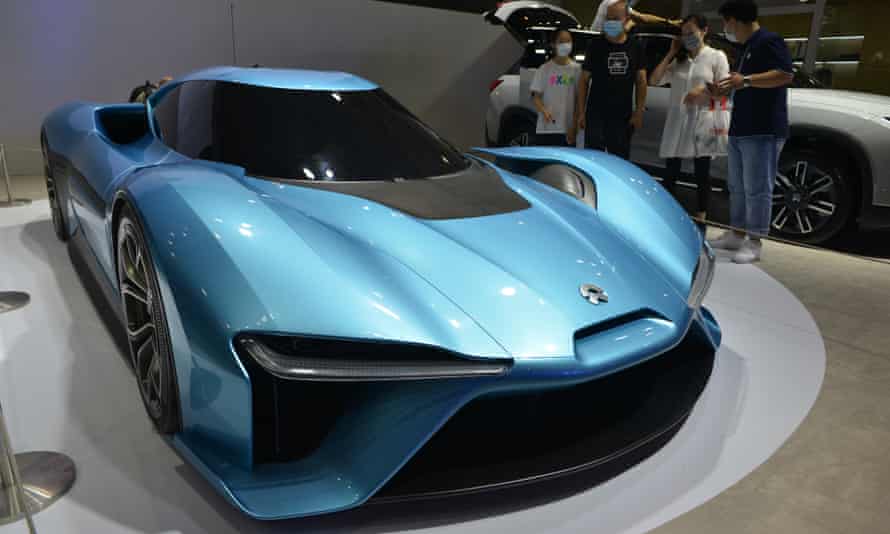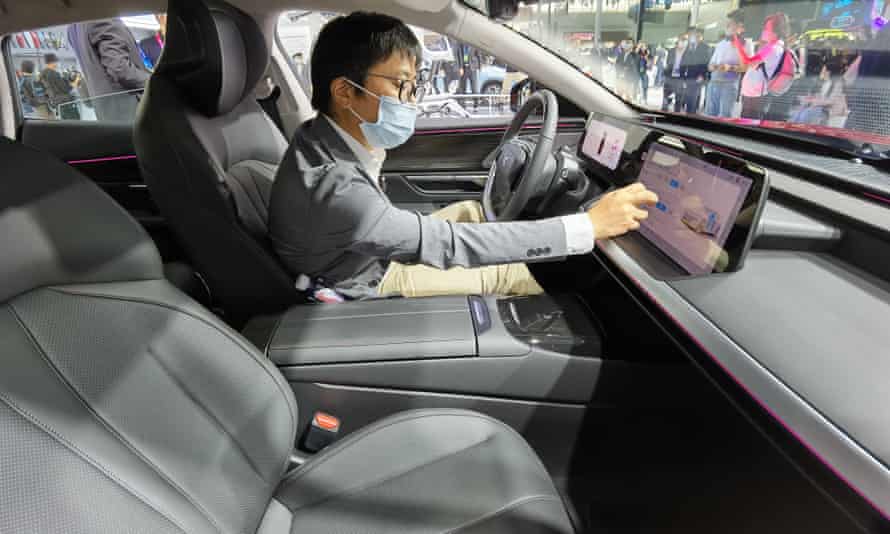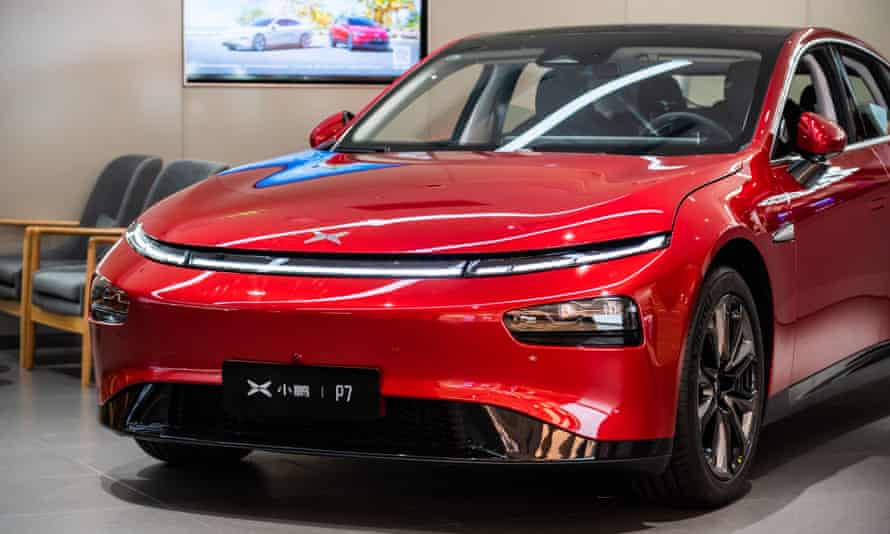Tesla CEO Elon Musk isn’t known for admiring his competition, but when Chinese manufacturer Nio made its 100,000th electric car last week, he congratulated him.
It was a token of respect from a CEO who had gone through “manufacturing hell” with his own company. But it is also a sign of the growing influence of Chinese electric car manufacturers. They hope to stake a spot among the heavyweights of the new industry and present Tesla – and the rest of the automotive industry – with a significant new challenge when it comes to catching up.
Tesla mania and cheap money have taken the market valuations of a group of electric car makers to astounding levels. Tesla’s value was over $ 830 billion (£ 600 billion) in January (now it’s around $ 700 billion – still nearly three times the size of closest rival, Japanese automaker Toyota).
Chinese competitors Nio, Xpeng and Li Auto have all risen in value quickly to compete with much larger and more established manufacturers – even though they never made a profit for the year – based on US stock market listings that retailed investors despite their values Access have fallen sharply from their highs earlier this year.
Your successful donations have enabled them to put money into competition with Tesla in China. Now they have their eyes on the European electric car market – the largest in the world.
An XPeng P7 on the New York Stock Exchange prior to the company’s IPO last year. Photo: Mike Segar / Reuters
This would put further pressure on older automakers like Volkswagen who are trying to rapidly expand production of electric cars. Premium automakers like the British Jaguar Land Rover or the German BMW could also lose out if Chinese brands take over some of their wealthy customers. Jaguar has pledged to drive fully electric by 2025, and BMW announced last month that half of its European sales will be electric by 2030.
China’s government saw the possibility of dominating a new sector by giving large subsidies to the electric car industry. According to Philippe Houchois, automotive analyst at US investment bank Jefferies, the resulting harvest by Chinese manufacturers follows the Tesla game book and is also not burdened by the cost of dismantling internal combustion engine factories.
When you’re Tesla, suddenly they’re competing locally, but they’re also competing for access to CapitalPhilippe Houchois, analyst
Li Auto, Nio and Xpeng could grow to be some of Tesla’s biggest rivals – Reuters reported last month that all three are keeping an eye on Hong Kong listings. Another Chinese startup, Faraday Future, announced in January that it would be listed in the US through a merger with a special purpose vehicle (Spac), bringing in $ 1 billion.
“When you’re Tesla, all of a sudden they are competing locally, but they are also competing for access to capital,” says Houchois.
Some Tesla competitors have similar technologies and similar emerging brands. Hui Zhang, executive vice president for Europe at Nio, told the Observer the luxury automaker wants to combine elements of Tesla and Apple, the world’s most successful consumer technology company.
Nio, known in its home market as Weilai, plans to sell vehicles in Europe this year. The plant can currently produce about 120,000 cars a year, significantly fewer than the nearly 500,000 Tesla produced in 2020. Nio avoided bankruptcy in early 2020 when the city of Hefei bailed it out, but has raised more than $ 4.5 billion in stocks and bond deals in recent months amid rising investor demand.
 A Nio EP9 sports car can be seen in Nanjing last year. Photo: Getty Images
A Nio EP9 sports car can be seen in Nanjing last year. Photo: Getty Images
Tesla will have an advantage in Europe if it opens a factory in Berlin this summer, but China’s automakers have the capital to start manufacturing in Europe too. Matthias Schmidt, a Berlin-based automotive analyst, says Chinese manufacturers will have a chance while Europe’s giants make profits from their gasoline and diesel models, as well as hybrids.
“Chinese manufacturers hoping to introduce battery electric vehicles,” says Schmidt, “have a four-year window to gain a foothold in a market that, to some extent, ends with a range of B-Team electrified products with limited supply plays the first half of the decade. ”
Chinese companies are already heavily involved in the electric car boom by producing lithium-ion batteries. China’s contemporary Amperex technology – better known as CATL – is a supplier to Tesla, has a factory in Germany, and last year developed a battery that can last a million kilometers of driving and charging.
 In the Xpeng P7 sedan. Photo: Getty Images
In the Xpeng P7 sedan. Photo: Getty Images
Another battery manufacturer that also produces electric cars is BYD, which has been supported by US investment billionaire Warren Buffett since 2008. Shares in the Shenzhen-listed company have more than tripled since early 2020 – even after falling from record highs in early February. In January, investor interest was harnessed and shares worth $ 3.9 billion were sold.
Competitors with deep pockets can spend big bucks on technology, which puts pressure on Tesla. Nio’s big selling point is that the batteries can be replaced by robots in minutes, eliminating the risk of range anxiety for EV drivers. $ 24 billion worth of Xpeng has invested heavily in autonomous driving software and could compete with Tesla in lucrative sales of subscription-based self-driving capabilities. The P7 sports sedan could appeal to potential buyers of Tesla’s Model 3 and Model S in Europe, rather than the wealthier customers wooed by Nio.
Xpeng, chaired by technology entrepreneur He Xiaopeng, has already launched its G3 SUV in Norway. Thanks to government subsidies, electric car sales were the first country last year where electric car sales exceeded internal combustion engine sales. Xpeng is now deciding which European markets to target next, its vice chairman Brian Gu told Automotive News in January.
Analysts have repeatedly indicated that Tesla’s electric car industry is in the middle of a downside bubble. But even if valuations continue to fall after the recent sharp declines, the makers have already received cheap funding that will enable them to compete for a significant segment of the market.
“Below what happens to the stock price, it’s a belief in the electric vehicle industry,” said Nio’s Zhang. “It is a belief in the business model that a company like Nio or Tesla tries to strike.”
 The Xpeng P7 sedan. Photo: Alex Tai / Shutterstock
The Xpeng P7 sedan. Photo: Alex Tai / Shutterstock
How they compare
Xpeng P7
Guangzhou-based Xpeng is considering launching its P7 premium sedan in Europe with downloadable updates for self-driving software.
price 229,900 yuan in China (£ 25,600) Range 439 miles (according to the relatively mild NEDC standard)
Nio ET7
A very large battery gives Nios sedan a long range and quick acceleration – 3.9 seconds to 100 km / h – when it competes against Tesla’s Model S.
price 448,000 yuan (£ 50,000) Range 621 miles (NEDC)
WORLD Tang EV600
Formerly a plug-in hybrid, the battery version of the Tang SUV will go on sale in Norway this year.
price 260,000 yuan (£ 28,900); Range 373 miles (NEDC)
Tesla Model Y.
The seven-seater SUV from Musk will be the first to roll off the assembly line in Berlin. The performance version can manage 0 to 60 mph in 3.5 seconds.
price $ 34,000 (£ 24,600) Range 303 miles (according to the more stringent WLTP standard)

